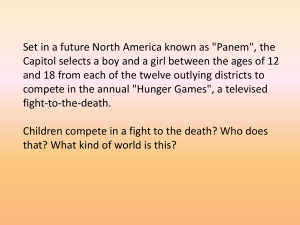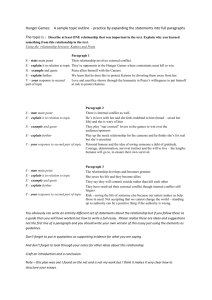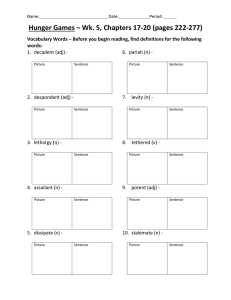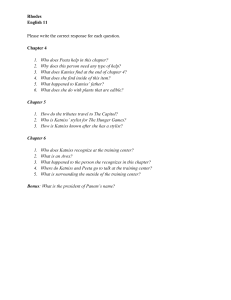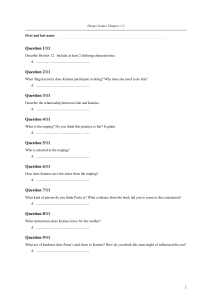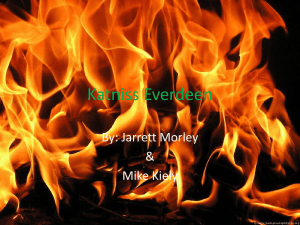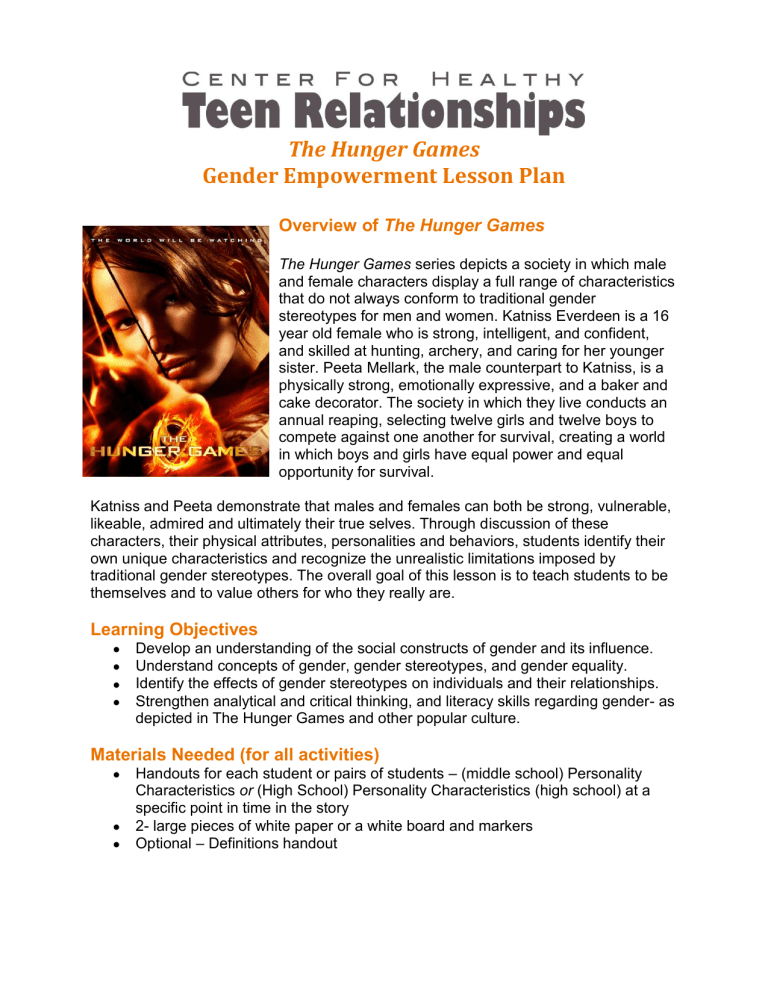
The Hunger Games Gender Empowerment Lesson Plan Overview of The Hunger Games The Hunger Games series depicts a society in which male and female characters display a full range of characteristics that do not always conform to traditional gender stereotypes for men and women. Katniss Everdeen is a 16 year old female who is strong, intelligent, and confident, and skilled at hunting, archery, and caring for her younger sister. Peeta Mellark, the male counterpart to Katniss, is a physically strong, emotionally expressive, and a baker and cake decorator. The society in which they live conducts an annual reaping, selecting twelve girls and twelve boys to compete against one another for survival, creating a world in which boys and girls have equal power and equal opportunity for survival. Katniss and Peeta demonstrate that males and females can both be strong, vulnerable, likeable, admired and ultimately their true selves. Through discussion of these characters, their physical attributes, personalities and behaviors, students identify their own unique characteristics and recognize the unrealistic limitations imposed by traditional gender stereotypes. The overall goal of this lesson is to teach students to be themselves and to value others for who they really are. Learning Objectives Develop an understanding of the social constructs of gender and its influence. Understand concepts of gender, gender stereotypes, and gender equality. Identify the effects of gender stereotypes on individuals and their relationships. Strengthen analytical and critical thinking, and literacy skills regarding gender- as depicted in The Hunger Games and other popular culture. Materials Needed (for all activities) Handouts for each student or pairs of students – (middle school) Personality Characteristics or (High School) Personality Characteristics (high school) at a specific point in time in the story 2- large pieces of white paper or a white board and markers Optional – Definitions handout Gender Empowerment 2 Estimated Time 45 - 50 minutes to complete the following activities: Activity #1- Personality Characteristics (separate handouts for middle and high schools), and Activity #2- Character Quotes Optional Activity #3- Writing Activity as a supplement to Activities #1 and #2. Definitions (for Instructor Use) Gender refers to the social attributes and opportunities associated with being male and female and the relationships between women and men, as well as the relationships between women and those between men. These attributes, opportunities and relationships are socially constructed and are learned through socialization processes. They are context/ time-specific and changeable. Gender stereotypes are generalized and/or assembled conceptualizations about people based on gender. Stereotypes depict simplified and rigid view of others and are centered on a limited number of characteristics. Stereotypes create an impression that everyone in the group has the same characteristics. Stereotypes create expectations of what males and females should look like and how they should think, feel, and act. Gender equality means that girls and boys, women and men have equal conditions for realizing their full human rights and for contributing to, and benefiting from, economic, social, cultural and political development. Gender equality is the equal valuing by society of the similarities and the differences of each other. Activity #1– Personality Characteristics Using commonly recognized characters from The Hunger Games, students will be able to identify actual characteristics of male and female characters in the story, understand how these comply or do not comply with traditional gender stereotypes and discuss the personal and societal value of gender equality. NOTE: The overall goal of this activity is to educate students about gender equality, and to help them conceptualize healthy gender roles within their own relationships. Instructions Give each student a Hunger Games Characteristic Sheet (not mentioned in materials section above. For middle schools, give each student a Personality Characteristics Handout. For high schools, give each student a Personality Characteristics, Behaviors, and Activities Handout. Have students work in pairs or small groups. To begin, ask each group to select examples from the handout for each category: personality characteristics, behaviors, and activities. Each character can have similar qualities and the words can be used more than once. After students have completed The Hunger Games Character Sheet, introduce the idea that gender is socially constructed. [Tip: post pre-printed term definition sheet for Gender for student reference.] Explain that books, movies, music and videos influence our understanding of gender - how to look, act, dress, and relate to others can be a source that contributes to this composition. Gender Empowerment 3 Class Discussion Questions - Gender and Gender Stereotypes Ask students to share the characteristics, behaviors, or activities they assigned to Katniss and Peeta. Ask students to differentiate between stereotypical characteristics and characteristics that do not conform to traditional gender stereotypes (i.e. Katniss “acting” to show the audience that she is in love with Peeta (stereotypical) versus Katniss prowess as a hunter (non-stereotypical). Ask students to look at the many characters in “Hunger Games” and assess which are conforming (i.e. Glimmer and Cato) and non-conforming to gender stereotypes (i.e. Katniss and Peeta). HIGH SCHOOL Handout: Ask students how the characteristics, behaviors, and/or activities changed depending on the situation the character was in? Why or why not? Class Discussion Questions - Popular Culture Explain to students how novels and other forms of popular culture can support a healthier and more holistic notion of masculinity and femininity by illustrating the full range of personal characteristics among both male and female characters. Ask students how they think authors, artists, and musicians might contribute to the social construction of gender. How does popular culture pressure young people to conform to traditional gender stereotypes vs. expressing their true selves? Ask how it would feel if more characters in books or popular culture were free to display a full range of characteristics, those that fit into traditional gender stereotypes and those that may not? How could books and movies contribute to a more holistic and realistic social construction of gender?” Activity #2 –Character Quotes Write each of the following quotes at the top of each piece of paper or a whiteboard. Record student’s responses to the questions that follow, under each character’s name: Katniss Everdeen “It was slow-going at first, but I was determined to feed us. I stole eggs from nests, caught fish in nets, sometimes managed to shoot a squirrel or rabbit for stew, and gathered the various plants that sprung up beneath my feet. Plants are tricky. Many are edible, but one false mouthful and you’re dead. I checked and double-checked the plants I harvested with my father’s pictures. I kept us alive.” Peeta Mellark “We were five. You had a plaid dress and your hair...it was in two braids instead of one. …’ So that day, in music assembly, the teacher asked who knew the valley song. Your hand shot right up in the air. She put you up on a stool and had you sing it for us. And I swear, ever bird outside the windows fell silent. And right when your song ended, I knew - just like your mother- I was a goner.” Gender Empowerment 4 After reading the quotes aloud from Katniss and Peeta, ask the students the following questions to generate discussion. Class Discussion Questions – Students own experience and impact on relationships What personality traits and behaviors do not conform to gender stereotypes? Does either of these characters remind you of yourself, someone you know? Do you have personal characteristics that conform and characteristics that do not necessarily conform to traditional gender stereotypes? Would you like to share them with the class? Class Discussion or Break into Small Group Discussion Questions You can give an option for groups to discuss and report back to the class to engage more students or continue as whole class discussion. How does it feel to read about characters who display such a full range of behaviors, activities and physical attributes including ones that might be considered outside of traditional gender stereotypes? Are these characters appealing? Why or why not? How to do you think characters like Katniss and/or Peeta contribute to or change our social construction of gender - or the way we think about gender? What is it like to look at male and female roles in a new and expanded way? What are some of the ways that traditional gender stereotypes affect individuals, relationships, families, and society? What role does gender play in your relationships with friends and dating partners? How does it affect who you are and who you date? What would change for us as individuals, in our relationships and in our society if men and women could be equally strong and equally vulnerable? Closure to Lesson Katniss and Peeta are equally strong, but in different ways. In a world where Katniss is skilled, confident, and a rescuer and Peeta is emotionally expressive, caring, and vulnerable – each person is free to be their true selves. Men and women take control over their own lives. Katniss and Peeta and the other characters pursue their own goals, live according to their own values, develop self-reliance, and are able to make choices and influence - both individually and collectively - the decisions that affect their lives. Being free to express your true self is critical to becoming a healthy individual and achieving a healthy relationship. For more information log on to www.lovewhatsreal.com or contact Center for Healthy Teen Relationships, a program of the Idaho Coalition Against Sexual & Domestic Violence , 208 384-0419, ext. 313 or email brandy@engagingvoices.org. Gender Empowerment 5 Personality Characteristics. List the top six most important personality characteristics, for each character. Compassionate Brave Rational Passive Nurturing Active Sensitive Emotionally expressive Intuitive Ambitious Detailed Dominant Graceful Courageous Adventurous Masculine Understanding Responsible Katniss Independent Pragmatic Assertive Strong Clever Competitive Intelligent Communicative Weak Competent Cooperative Timid Aggressive Muscular Cheerful Feminine Self-sufficient Reliable Peeta 1. 1. 2. 2. 3. 3. 4. 4. 5. 5. 6. 6. Gender Empowerment 6 Select the characteristics that best describe Katniss and Peeta at different points in the story (Before Reaping, Television Interviews, and During the Games). Characteristics Peacemaker Intelligent Independent Determined Rebel Affectionate Adventurous Self-reliant Competitive Brave Goal-oriented Cooperative Caring Confident Responsible Character Katniss Peeta Rescuer Rescued Assertive Nurturer Strategic Cries Yells Mediator Emotional Risk taker Caregiver Fights Protector Risk-taker Before Reaping Archery Cake frosting Bread baking Fashion Design Hunting Selling Buying Reading Painting Knot tying Weight lifting Household Chores Makeup artist Caretaker 1. Television Interview 1. During the Games 1. 2. 2. 2. 3. 3. 3. 4. 4. 4. 5. 5. 5. 6. 6. 6. 1. 1. 1. 2. 2. 2. 3. 3. 3. 4. 4. 4. 5. 5. 5. 6. 6. 6. Gender Empowerment 7 Optional Extension - Writing Activity The Hunger Games characters exemplify people who display a full range of characteristics and as such, do not conform to traditional gender stereotypes. Are these characters compelling because they seem consistent with socialized norms - or because they embody a radical departure from the norms - within the Hunger Games society? I.e., a society dedicated to death-match competition for resources? Write a character portrait the demonstrates a full range of characteristics! Have the students respond to the following questions. Start with the basics: What is your character’s name? How old is the character? Is this person a boy or a girl? Where does your character live? What is your character’s family situation? Think about your character’s personality for the following questions: What is your character like? What do they do on the weekend? What is your character proud of? What makes your character feel embarrassed? Two things your character wants. Two things your character fears. One secret your character has. Encourage students to be specific. Then, after the characters are created, ask the students what kind of story they’d like to read about this person. Have volunteers share their character portraits. Lesson plan developed by Idaho Coalition Against Sexual & Domestic Violence Center for Healthy Teen Relationships and Start Strong Idaho Team, Expect Respect Team Safe Place Austin, Texas; Patti Bellan, MA, Malia Collins, MFA, and Josie Fretwell, MA April 2012 © This project was supported by Grant No. 2011-TA-AX-K055 awarded by the Office of Violence Against Women, U.S. Department of Justice. The opinions, findings, conclusions, and recommendations expressed in this publication/program/exhibition are those of the author(s) and do not necessarily reflect the views of the Department of Justice, Office on Violence Against Women. Gender Empowerment 8 Definitions Gender refers to the social attributes and opportunities associated with being male and female and the relationships between women and men, as well as the relationships between women and those between men. These attributes, opportunities and relationships are socially constructed and are learned through socialization processes. They are context/ timespecific and changeable. Gender stereotypes are generalized and/or assembled conceptualizations about people based on gender. Stereotypes depict simplified and rigid view of others and are centered on a limited number of characteristics. Stereotypes create impression everyone in the group has the same characteristics. Stereotypes create expectations of what males and females should look like and how they should think, feel, and act. Gender equality means that girls and boys, women and men have equal conditions for realizing their full human rights and for contributing to, and benefiting from, economic, social, cultural and political development. Gender equality is the equal valuing by society of the similarities and the differences of each other. Center for Healthy Teen Relationships Community Education Reporting Form Please return form after each event to M i c a e l a @ e n g a g i ng vo i c e s . o r g , o r f a x t o 208-331-0687 Presenter: ___________________ Agency: Address: Phone: Email: ______________________ 1. Total number of education events provided (minimum 10 person/event 2. Date of Presentation: 3. Name of Organization: 4. Address of Presentation: City: 5. Did anyone who attended the presentation come from a rural community: Yes No 6. Number of people educated (Use the category that is most descriptive of the people attending the education event) People educated (actual number/category) ______Child care providers ______Community advocacy groups (NAPCA, NAACP, NAMI) ______Community businesses (retail stores, pharmacies) ______Community groups (service or social groups) ______Community members (unaffiliated adults) ______Educators and/or school administrators _______Elementary school students ______Faith-based groups ______Middle and high school students ______Parents or guardians ______University or college students ______Victims/survivors (do not count psycho-education groups) ______Other (specify): 7. Topics of education events ______Healthy Friendships ( _ grade) ______Healthy Relationships ( grade) ______Teen Dating Violence- Teens (6-12 grade) ______Teen Dating Violence- Adult ______Other (must be approved under project): _____________________ 8. Materials handed out (estimate quantities) ______Teen Dating Violence brochure ______Parent handbook ______Stickers Buttons ______Other For questions on the Idaho Teen Dating Violence Project or this form, contact the Idaho Coalition Against Sexual & Domestic Violence 1-888-293-6118
